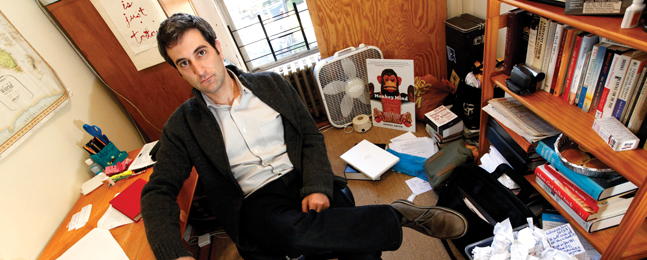High Anxiety
A Q&A with Daniel Smith ’99, author of the memoir "Monkey Mind"

Photo by Mike Lovett
In “Monkey Mind,” you describe Brandeis as “the only nonsectarian, Jewish-sponsored institution of higher learning in the country and therefore, presumably, one of the world’s anxiety epicenters.”
That’s one of the statements in the book that is more a gag than in real earnest. It’s not really about Brandeis as much as it is about Jews and anxiety. Jews are adept at performing their anxieties. Being chased around the globe by people who want to murder you and erase your race will give you a bit of a complex. There’s also an aspect of Jewish culture that says, “You can’t fire me. I quit!” If you’re going to portray me as a weak-willed Jew, then I’ll show you weak-willed and, by portraying it, subvert that accusation, becoming a hero.
Reading Philip Roth in the basement of Goldfarb Library changed your life. How?
First of all, Roth showed me a way to salvation through work, through his monastic devotion to writing. I was drawn to that. I learned what sentences are from Roth. I learned how to measure out clauses by scrutinizing his exquisitely balanced sentences. I also learned that anxiety is not a disorder so much as it is an experience and that there’s nobility in struggle. But I have since come to see that there’s a real paucity of compassion in his work and his life, an Olympian coldness and brutality in his vision of the world. And that’s dangerous.
Few professions seem more angst-ridden than the writer’s life, with its endless solitude, often-bottomless financial insecurity, potential for cruel treatment at the hands of critics, and blank pages.
Yes, you’re right. Anxiety is related to time: You’re obsessing about the future; you’re not existing in the present moment. You spend most of your time staring at a blank page, or worrying about the monumental shittiness of what you’ve written and how it will ruin you in the future. It’s crazy, but it beats having to be in an office where you feel like there are wolves tearing at your intestines — anxiety sufferers don’t like to be in social environments.
Are you happy with this book?
I started writing at Brandeis, and it was so excruciating and painful — I spent two weeks just refining every comma placement. But with this book, I enjoyed myself for the first time. I see every single deficiency in it, and I live in terror of other people discovering those deficiencies, but I’m gratified that “Monkey Mind” has found an audience.
How have readers responded?
It’s been overwhelming. I have received hundreds of emails from readers who say, “For the first time, I feel my experience is described,” and “You’ve given me something to give my loved ones that describes my pain and my experience,” and “Now I understand my husband, my son, my wife better.” I try to respond to all of these emails. I’ll go to a book reading — and every time more than 100 people have come out — and I spend a lot of time afterward hugging readers. That’s all I can do. I’m not a doctor; I’m just a writer. I give electronic and physical hugs, because you can never have too many of those.
What’s next?
I am starting to work on another book that is narrative in nature. But it’s not time yet to send out a birth announcement. I don’t even know if it’s been conceived yet.
— Laura Gardner
